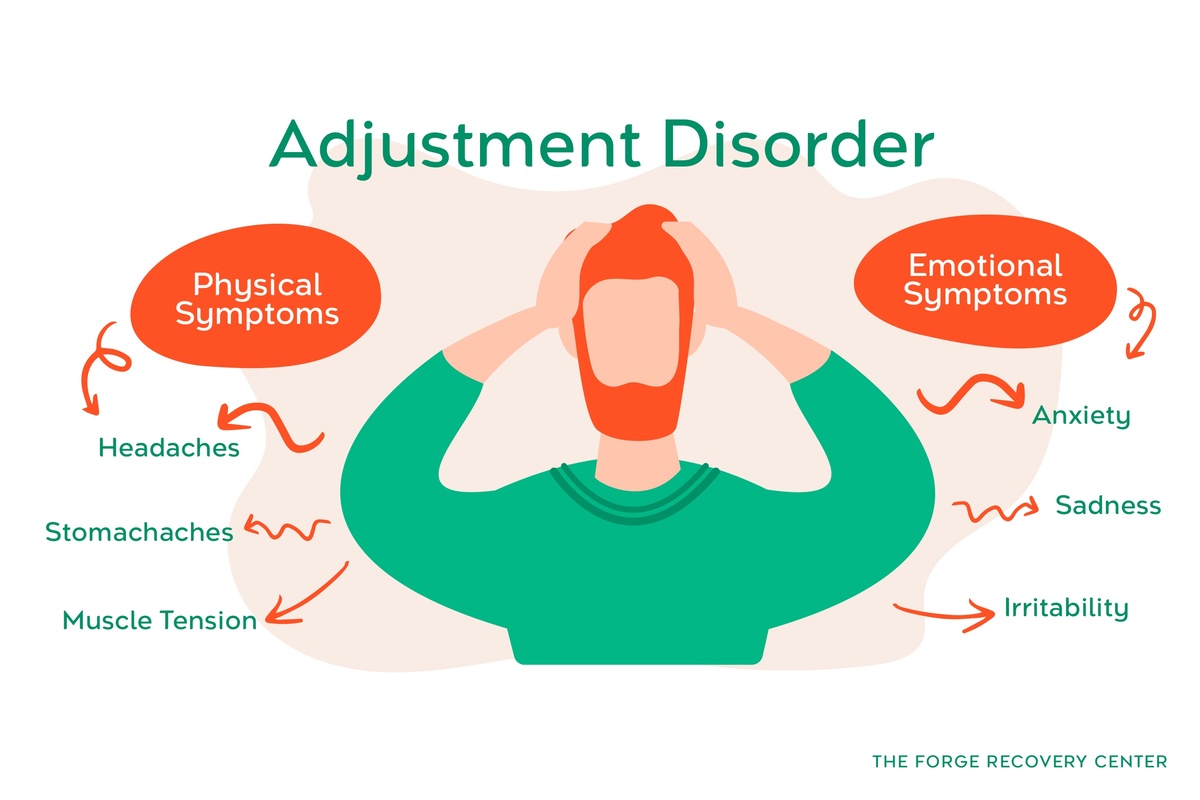Adjustment Disorder: Symptoms, Causes, & Treatment Options


Adjustment disorder can stir up stress, leading to anxiety, sadness, and major interruptions to life as a whole. But you’re not alone, and help is available. Treatment often combines therapy and medication, administered by a mental health professional or at a treatment center. Learn more about adjustment disorder’s symptoms and treatments, and if you or a loved one need professional help, call The Forge Recovery Center today for support.
What Is Adjustment Disorder?
Adjustment disorder is a mental health condition characterized by emotional or behavioral symptoms that occur within three months of a stressful event. These symptoms can include feeling overwhelmed, anxious, sad, or having difficulty coping with daily life. Unlike other mental health disorders, adjustment disorder is directly linked to a specific stressor and tends to improve once the stressor is removed or the individual adapts to the situation.
Adjustment Disorder in the DSM-5
In the DSM-5, Adjustment disorder is categorized as a stress-related condition. It occurs when you struggle to cope with a particular stressor or life event.
The diagnosis of adjustment disorder involves experiencing emotional or behavioral symptoms within three months of a stressful event. One characteristic of Adjustment disorder is that once the stressor is removed or the situation improves, these symptoms tend to decrease over time without specific treatment. However, if left unaddressed, Adjustment disorder can lead to more severe mental health issues like anxiety or depression.

Adjustment Disorder Symptoms
Adjustment disorder carries both emotional and physical symptoms that can weigh on your day-to-day. Here’s a summary of symptoms associated with this condition:
Emotional Symptoms
When experiencing adjustment disorder, you might notice a range of emotional symptoms. These can include feelings of anxiety, sadness, or overwhelm in response to a stressful event. You may also struggle with excessive worry, tearfulness, or irritability.
Some individuals with adjustment disorder might find themselves constantly preoccupied with the stressor, making it challenging to focus on daily tasks. you could encounter a sense of hopelessness or lack of enjoyment in activities that once brought pleasure.
Physical Symptoms
Alongside emotional manifestations, adjustment disorder can also manifest through physical symptoms. You might experience headaches, stomach aches, or muscle tension due to the stress and emotional strain. These physical symptoms can vary in intensity and may impact your overall well-being.
In some cases, individuals with adjustment disorder may also face sleep disturbances such as insomnia or oversleeping. These disruptions in sleep patterns can further exacerbate the emotional distress caused by the triggering event..

Are You Struggling with Mental Health or Addiction?
We Can Help. Call Us Now!
CALL: 877-839-1772
Treatment Options for Adjustment Disorder
Treatment for adjustment disorder typically involves a mix of therapy and medication, which can be administered by a mental health professional or at a mental health treatment center. Let’s explore these options further:
Therapy
When seeking treatment for adjustment disorder, therapy is a common and effective approach. Cognitive-behavioral therapy (CBT) focuses on changing negative thought patterns and behaviors. It helps you develop coping strategies and problem-solving skills to manage stress.
Interpersonal therapy (IPT) is another beneficial option. This therapy concentrates on improving communication and relationship skills. By addressing conflicts and enhancing social support, IPT assists you in navigating challenging life transitions more effectively.
Medication
In some cases, medication may be prescribed to alleviate symptoms of adjustment disorder. Selective Serotonin Reuptake Inhibitors (SSRIs) are commonly used to reduce anxiety and depression symptoms. These medications can help stabilize mood and promote a sense of well-being.
Another type of medication that might be prescribed is Benzodiazepines. These are sedatives that can provide short-term relief from severe anxiety or insomnia related to adjustment disorder. However, they are typically used cautiously due to the risk of dependence.
Mental Health Treatment Centers
For individuals requiring intensive support, mental health treatment centers offer comprehensive care for adjustment disorders. These centers provide a structured environment where you can receive therapy, medication management, and support from mental health professionals.
In these facilities, you have access to a multidisciplinary team including psychiatrists, psychologists, social workers, and counselors. This collaborative approach ensures that you receive personalized treatment tailored to your specific needs.
Causes of Adjustment Disorder
Adjustment disorder is unique in that it can arise out of common, yet distressing situations. Deep financial burdens, being overwhelmed at work, the death of a loved one — all of these scenarios can trigger adjustment disorder. Here’s a more in-depth summary of the causes:
Stressful Situations
When facing difficult times, you may experience adjustment disorder due to stressful situations, such as losing a job or financial struggles. These events can overwhelm you, leading to emotional distress and difficulty coping.
Examples of stressful situations include relationship issues, work-related stress, or academic pressure. Your ability to adapt to these challenges may be compromised, triggering symptoms of adjustment disorder like anxiety or depression. Some other examples include:
Feeling overwhelmed by daily responsibilities
Struggling to balance work and personal life
Experiencing conflicts with family members or colleagues
Significant Life Changes
During significant life changes like moving to a new city or starting a new job, you may be susceptible to adjustment disorder. These transitions can disrupt your sense of stability and routine, causing emotional turmoil and confusion.
Your mental health can be impacted by major life events such as marriage, divorce, or the loss of a loved one. Adjusting to these changes may prove challenging, manifesting in symptoms like irritability or social withdrawal. Here are a few other common examples:
Moving to a new place far from familiar surroundings
Starting a new school or university
Dealing with the death of a close friend or family member
Are You Struggling with Mental Health or Addiction?
We Can Help. Call Us Now!
CALL: 877-839-1772
Potential Complications
If left unaddressed and untreated, adjustment disorder can pose certain risks, including chronic stress and suicidal thoughts:
Chronic Stress
Chronic stress can exacerbate adjustment disorder, leading to prolonged emotional turmoil. You may experience persistent anxiety, irritability, and difficulty concentrating. This ongoing stress can impact your daily life, relationships, and work performance.
In more severe cases, chronic stress from adjustment disorder can manifest physically. Symptoms such as headaches, digestive issues, and sleep disturbances may become prevalent. Your body's response to stress can weaken your immune system, making you more susceptible to illnesses.
If left unaddressed, chronic stress associated with adjustment disorder can escalate into other mental health conditions. Depression and anxiety disorders are common comorbidities that may develop over time. Seeking professional help is crucial to manage chronic stress effectively.
Suicidal Thoughts
Experiencing adjustment disorder can sometimes lead to suicidal thoughts, especially during periods of intense emotional distress. You may feel overwhelmed by negative emotions and a sense of hopelessness. It's essential to recognize these thoughts as a serious symptom that requires immediate intervention.
In moments of deep despair, seeking support from loved ones or mental health professionals is vital. Openly discussing your feelings and thoughts can help alleviate the burden you may be carrying alone. Remember that suicidal thoughts are not uncommon in mental health struggles.
If you or someone you know is experiencing suicidal thoughts, do not hesitate to reach out for help. Contact a crisis helpline or emergency services immediately. Remember that there is always support available to guide you through challenging times.

Adjustment Disorder Management
Managing adjustment disorder is a matter of reducing your stress levels, and ensuring you have a solid support system in place. This can be done by identifying your triggers and developing coping responses to those situations, and being open to turning to friends and family for help.
Managing Stress
When managing stress, it's crucial to identify your triggers and develop healthy coping mechanisms. Exercise regularly to reduce stress levels and improve your overall well-being. Practice mindfulness through activities like meditation or deep breathing exercises.
Create a daily routine that includes time for relaxation and self-care. Set boundaries to protect your mental health, such as limiting exposure to stressful situations or people. Seek professional help if you're struggling to cope with stress on your own.
Support Networks
Build a strong support network consisting of friends, family, or support groups. Open up to trusted individuals about your feelings and experiences. Stay connected with loved ones through regular communication and social interactions.
Join community organizations or online forums where you can share your struggles and receive emotional support. Attend therapy sessions or counseling to work through your emotions in a safe environment. Remember, seeking help is a sign of strength, not weakness.
Are You Struggling with Mental Health or Addiction?
We Can Help. Call Us Now!
CALL: 877-839-1772
Adjustment Disorder Prevalence
Statistics Overview
Adjustment disorder is a common mental health condition, affecting 11.5% of individuals at some point in their lives. It often occurs in response to stressful life events.
Age and Gender Trends
In terms of age, young adults are more susceptible to adjustment disorder due to the numerous life changes they experience. Women tend to be diagnosed with this disorder more frequently than men.
Seeking Help
When you notice persistent feelings of anxiety, sadness, or hopelessness after a major life event, it's crucial to acknowledge the signs. Your daily routines disrupted by emotional distress could indicate the need for professional support.
If you experience difficulty coping with stressors like work, relationships, or school due to overwhelming emotions, consider seeking help. Ignoring these feelings might lead to worsening symptoms and impact your overall well-being.
Finding a Therapist or Treatment Center
To find the right therapist or treatment center for help with adjustment disorder, start by researching licensed mental health professionals in your area. Consider therapists specializing in cognitive-behavioral therapy (CBT) or other evidence-based treatments.
Look for therapists who have experience in treating adjustment disorders specifically. A good fit between you and the therapist is essential for effective treatment outcomes. Don't hesitate to ask about their approach and how they can support you through this challenging time.

Are You Struggling with Mental Health or Addiction?
We Can Help. Call Us Now!
CALL: 877-839-1772
Closing Thoughts
Now that you understand adjustment disorder, its symptoms, treatment options, causes, complications, prevalence, and prevention strategies, it's crucial to prioritize your mental well-being. Seek help if you or a loved one exhibits signs of adjustment disorder. Remember, early intervention can make a significant difference in managing this condition effectively. Take the necessary steps to address any challenges you may face.
Don't hesitate to reach out to mental health professionals for support and guidance. Your mental health matters, and seeking help is a sign of strength. By taking proactive measures and being aware of the resources available to you, you can navigate through adjustment disorder with resilience and determination.
Adjustment Disorder Treatment in Orange County
Adjustment disorder can turn your world upside down, leading to unease, melancholy, and a disruption in your daily rhythm. But you’re not alone, and professional help is available to lift you out of this hole. At The Forge Recovery Center, we offer a team of mental health experts to help you restabilize and gain the tools to handle life’s twists and turns. Explore our treatment modalities below, and don’t hesitate to reach out to us if you or someone you know are in need of support.
Treatment Modalities We Offer
At The Forge Recovery Center, we use evidence-based therapies to support your healing journey, such as:
Case Management
Our experts steer clients towards resources that support recovery, evaluating individual risks to formulate a holistic treatment plan.
CBT
CBT aids clients in altering detrimental thought cycles and behaviors associated with drug dependency, with the goal of preventing relapse and promoting a life free from drugs.
DBT
DBT aids those grappling with emotional instability due to substance abuse, promoting emotional control and positive lifestyle modifications.
EMDR
EMDR enables clients to address trauma that may influence their addiction, employing eye movement methods to lessen psychological distress.
Experiential
Through experiential therapy, participants rekindle the pleasures of life and confront the root trauma of addictive behaviors through engaging therapeutic exercises.
Family Counseling
Family counseling strengthens family bonds and nurtures a supportive environment crucial for sustained recovery and sobriety.
Group Therapy
Group therapy sessions focus on the distinct hurdles each client encounters, supporting their journey towards a life without substances.
Individual Therapy
Tailored individual therapy focuses on the distinct hurdles each client encounters, supporting your journey towards a life without substances.
MAT
Medication-assisted treatment (MAT) merges approved medications with therapy to effectively fight addiction, alleviating withdrawal symptoms and minimizing relapse risk.
TMS
Transcranial magnetic stimulation (TMS), a non-intrusive technique, employs magnetic fields to stimulate the brain, aiding in the reduction of intense drug cravings.
Motivational Interviewing
Motivational interviewing empowers clients to make healthier decisions, such as overcoming cocaine addiction, by cultivating a sense of personal empowerment.
Trauma-Informed Care
Acknowledging the role of trauma in addiction, this approach has been shown to effectively guide clients through treatment and comprehend its effect on their psychological and emotional well-being.



